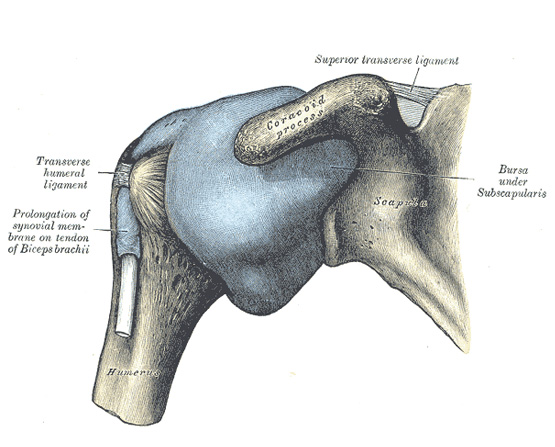FROZEN SHOULDER
A frozen shoulder is shoulder joint that is significantly limited in its range of motion in all directions. The range of motion is limited not only when the patient attempts motion, but also when the doctor attempts to move the joint fully while the patient relaxes. A frozen shoulder is also referred to as adhesive capsulitis.
Frozen shoulder is the result of scarring, thickening and shrinkage of the capsule that surrounds the normal shoulder joint. Any injury to the shoulder can lead to frozen shoulder, including tendinitis, bursitis, and rotator cuff injury. Frozen shoulders occur more frequently in patients with diabetes, chronic inflammatory arthritis of the shoulder, or after chest or breast surgery. Long-term immobility of the shoulder joint can put persons at risk to develop a frozen shoulder.
A frozen shoulder is suggested during examination
when the shoulder range of motion is significantly limited, with
either the patient or the examiner attempting the movement. Underlying
diseases involving the shoulder can be diagnosed with the history,
examination, blood testing, and x-ray examination of the shoulder.
If necessary, the diagnosis can be confirmed when an x-ray contrast
dye is injected into the shoulder joint to demonstrate the characteristic
shrunken shoulder capsule of a frozen shoulder. This x-ray test
is called arthrography. The tissues of the shoulder can also be
evaluated with an MRI scan.
For more information on other diseases that can be treated with Topical Verapamil, follow the links for each disease.
KELOIDS
Keloids are raised, reddish nodules that develop at the site of an injury. After a wound has occurred to the skin both skin cells and connective tissue cells (fibroblasts) begin multiplying to repair the damage.
LEDDERHOSE
Ledderhose Disease Disorder of unknown etiology characterised by local proliferation of abnormal fibrous tissue in the plantar fascia. This tissue is locally aggressive and progressively replaces the normal plantar aponeurosis.
PEYRONIE'S DISEASE
Peyronie's Disease is a curvature, lump or hard area observed in the penis. Painful erections and penile pain are also symptoms of this condition.
TRIGGER FINGER
Trigger Finger is caused by a thickening on the tendon catching as it runs in and out of the sheath. The most common cause is tenosynovitis.
DUPUYTREN'S CONTRACTURE
Dupuytren's Contracture is a thickening of deep tissue (fascia) which passes from the palm into the fingers. Shortening of this tissue causes "bands" which pull the fingers into the palm.
FROZEN SHOULDER
Frozen Shoulder is shoulder joint that is significantly limited in its range of motion in all directions. The range of motion is limited not only when the patient attempts motion, but also when the doctor attempts to move the joint fully while the patient relaxes.
HYPERTROPHIC SCAR
Hypertrophic Scar looks similar to a keloid. Hypertrophic scars are more common. They don't get a big as keloids, and may fade with time. They occur in all racial groups.
SYMPTOM

DOT COM

ADDRESS
2950 Thousand Oaks Dr., Suite 25, SA, TX
CALL US
1-800-250-6232

